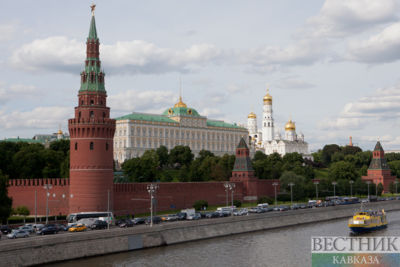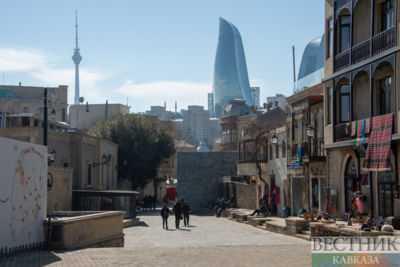Tribuna’s guest is the Vice Speaker of the Upper Chamber of the Russian parliament, Ilyas Umakhanov. He speaks about the World Congress of Compatriots, the parliamentary elections in Azerbaijan, the hajj, and the work of the AYOR and the EAEU.
- The World Congress of Compatriots took place in Moscow. The President and the head of the Federation Council participated in the opening ceremony. The forum becomes more and more attractive every year. Does the government pay sufficient attention to compatriots?
- There is big interest in the events in the Russian Federation among our compatriots in the world. Representatives of 97 countries participated in the Congress. The leadership of the country carries out a serial line on improvement of working with compatriots. Primarily, it is promotion of the Russian language, Russian schools, Russian culture and literature, without which compatriots abroad would feel uncomfortable. The turning point was the establishment of Rossotrudnichestvo, which is aimed at promoting soft power elements, relying on our compatriots. Almost every country has centers which coordinate and systematize the work. Great attention is paid to compatriots by social and religious organizations. Patriarch Kirill spoke at the forum about spirituality, culture and religion as important elements of strengthening ties with the Motherland. In general, it provides an effect in which we feel greater security of our compatriots (these are 30 million people), and we see systemic targeted work by responsible bodies, social structures, and ordinary citizens encouraging such cooperation.
I remember several wonderful initiatives, for example, publishing a special History textbook for our compatriots; initiatives on creating a series of monuments which would symbolize the reconciliation of different generations of compatriots who have left their motherland unwillingly, but today they are ready to contribute morally, politically and administratively to the revival of Russia.
I’m sure that year by year the work will strengthen, and it is important not only to hold beautiful congresses, but also to find new formats of work involving young people.

- Last weekend elections were held in Azerbaijan, you visited it with a parliamentary delegation as an observer from the Federation Council. What was the atmosphere at the elections like?
- I have experience to compare with. It’s not the first time I have participated in a CIS mission in Azerbaijan. I visited the presidential elections, the parliamentary elections. I should point out the qualitatively different organization of the elections. These are the most modern technologies, including web-cameras, transparent ballot boxes, an opportunity to accommodate a large number of observers. I managed to visit 15 ballot stations in the first half of the day. All of them were situated in roomy buildings where all the necessary work could be provided.
Even though the weather wasn’t good – it was cool and windy – people went to the ballot stations in a good mood. In the countryside people had greater emotional lift than in Baku. When people come to vote early in the morning, it reminds me of Soviet times, when people treated elections like a holiday.
Voter activity was lower in Baku, but all in all 55% is a good result, which shows that nobody has multiplied the figures artificially. People have a right to free expression of their attitude toward parties and candidates. There were many independent candidates. More than 5 candidates applied for each seat in the parliament.
Of course, probably there were some small violations, like at any elections, but there were not crucial violations which could cast discredit on the results of the elections. In recent years, Azerbaijan has adopted a series of laws which correspond to modern election practices and European standards. Moreover, there are positive changes in the socio-economic life of the Azerbaijani people. Thus, people went to the elections in a good mood, they knew that there was progress, reforms took place, and socio-political consolidation was present.
- Should we expect any changes in the republic’s policy toward Russia in the near future?
- I want to believe that changes can only come about in a positive way, as our peoples are tied by centuries-long friendship and cooperation. Today there is active cooperation in the economic sphere. Agricultural trade turnover is growing. There are nice examples of cooperation in the humanitarian sphere: a branch of the Sechenov Medicine Academy has been opened recently; a branch of MSU was previously opened in Baku. At the same time, 100 schools in which the Azerbaijani language is taught are operating in Russia. This is in the interests of our peoples.
- You met Ilham Aliyev in Baku. What topics did you discuss at the meeting?
- The first and the main topic was the impressions of the elections. By that moment, I and my colleagues had visited a lot of polling stations, and there were representatives of other organizations. Everything was well organized, reflected the best standards of election organization; and I shared my thoughts with the President. He said that a system has been built where people could watch what was happening at ballot stations online, as many of them had web-cameras. Such perfect forms of monitw and observing elections are not commonly used even in the West.
- And it has been implemented in Russia recently…
- This is true. There are certain things which we could learn from Azerbaijan. There were people who didn’t come to observe the elections, referring to the fact that there could be violations there. This is quite a cynical approach, as a mission requires that you should observe and compare voting rights and election laws with existing practice.
- You have also participated in the annual forum of the AYOR. What role do the young people of Azerbaijan play today?
- It was the sixth forum in Moscow. I was pleased with the organization of the Azerbaijani youth living in Russia. They touch on a wide spectrum of problems, including planting trees, donation of blood, holding cultural events, sporting events. By the way, when we talked to President Aliyev, I mentioned the AYOR. The President said that there were two main goals which the Association of the Azerbaijani Youth of Russia had – to represent their country decently and be its brand; and on the other hand, to help Azerbaijani youth to adapt to Russian conditions, Russian laws, to integrate into Russian society.
These two goals are interconnected. When such an organization appears, it is a really big support for the work in regions. The AYOR has 70 offices in 70 regions of Russia.
- Is Azerbaijan’s membership in the EAEU possible? What could the membership give it?
- Any integration extends opportunities for economic cooperation, for trade turnover of countries, for investment activity. And the EAEU, which tends towards expansion, is a very interesting market for Azerbaijan, from the point of view of free flow of capital, goods and services. These are potential opportunities which would be open to Azerbaijan if it were a member of the Union. However, there is a certain distance between potential and the mechanisms of its implementation. The attractiveness of the growing EAEU to other countries depends on whether it works well in the context of the unfavorable international economic situation. The organization is open to cooperation which can develop in various spheres – from full membership to associative forms, if they do not contradict agreements which have already been signed and are operating in the EAEU. We speak about this not only in the context of separate countries, but also integration entities. It touched on suggestions which were voiced on Ukraine many years ago; it touches on the European Union and many other integration units.

- As the head of the Russian hajj mission, could you please sum up the results of this year?
- For many years, the unique system of hajj management, which includes participation of the authorities, the Commission for Religious Unions Affairs under the Russian government, spiritual departments, Russian regions, has been giving good results.
A bright example are the Crimean Tatars who doubled their representation among pilgrims. They have naturally integrated into the general Muslim ummah, which is not divided into nationalities and presents all-Russian unity while carrying out the hajj. There are several drawbacks on financial discipline, risks of using some airlines, but a final mark of 'C+' can be giveb to the hajj results.
A peculiarity of this hajj was that we didn’t use the whole quota for the first time. This was connected with economic conditions, the events which have happened in Saudi Arabia ahead of and during the hajj. It influenced the number of people who expressed their desire to carry out the hajj.
- If Russia didn’t use the whole quota, could it be reduced for our country?
- I don't think that will happen. The quota is issued according to a percentage principle – one pilgrim per thousand Muslims. Nobody has cancelled the formula; an exception was made three years ago, according to an initiative by Saudi Arabia itself. It reduced the quota because of reconstruction work in Mecca. I think that after the stabilization of the economic situation, the dollar exchange rate, the number of pilgrims will always be significant.
















